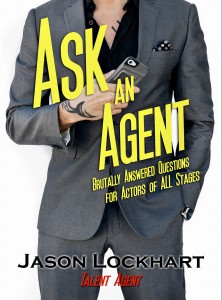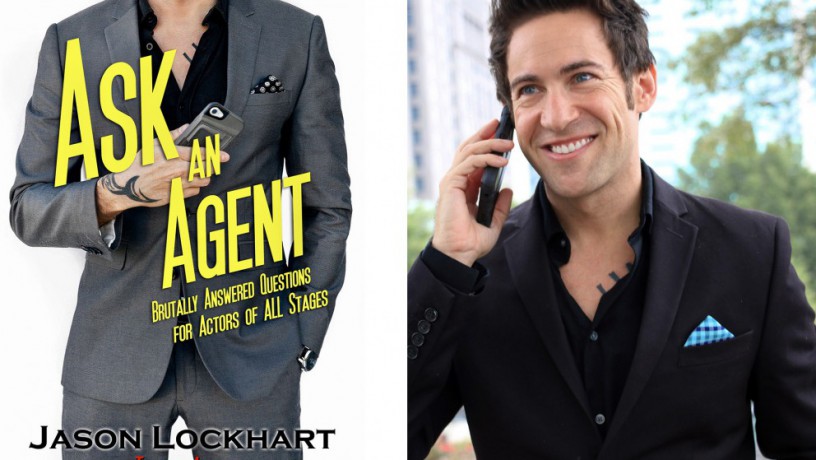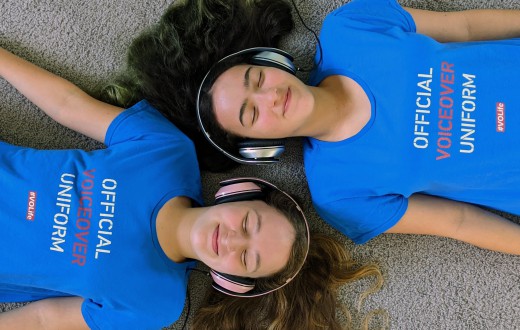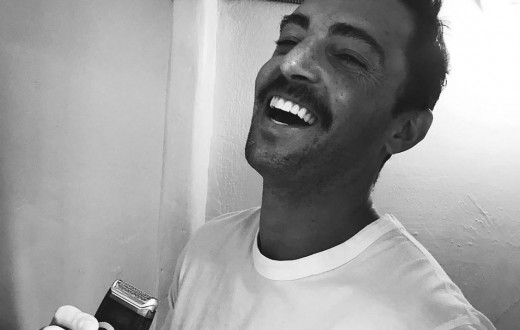By: Kayla Klatzkin
Jason Lockhart looks every bit the part of the hip Hollywood agent. Tattooed, in a stylish suit, fast talking and confident from his years of experience and success in the industry, you can tell right away this is a guy who gets things done – and any actor would be lucky to have him in their corner. Except Mr. Lockhart is not a Hollywood agent, he is based in Atlanta, heading the TV/Film division of Atlanta Models & Talent, Inc. (AM&T). And get things done he does, with his clients booking Stranger Things, The Walking Dead, among many other prestigious projects. Not content to simply be successful, he wants to give back, releasing a book  to help actors called Ask an Agent: Brutally Answered Questions for Actors of all Stages, which covers pretty much every question an actor might ask an agent during the course of their career. Thorough, informative, with no sugar coating, this book should be required reading for any actor looking to both find and get the most out of the actor-agent relationship. It’s also a fun read, very much in his own voice and with a healthy dose of humor. I was lucky enough to get to chat with Mr. Lockhart via FaceTime for this interview, and as an actress myself, was excited to learn as much as I could from him during our brief time together.
to help actors called Ask an Agent: Brutally Answered Questions for Actors of all Stages, which covers pretty much every question an actor might ask an agent during the course of their career. Thorough, informative, with no sugar coating, this book should be required reading for any actor looking to both find and get the most out of the actor-agent relationship. It’s also a fun read, very much in his own voice and with a healthy dose of humor. I was lucky enough to get to chat with Mr. Lockhart via FaceTime for this interview, and as an actress myself, was excited to learn as much as I could from him during our brief time together.
…
Your path to becoming an agent was definitely unique. Can you tell our readers a little bit about how you got to where you are today?
…
Well, honestly, I felt like I kind of stunk at everything else, but loved the industry so much. So I wanted to be an actor, and I wasn’t really making it, and I tried writing and directing, wasn’t really cracking it. I had little successes, but it wasn’t longevity. It wasn’t going to pay the bills or health insurance. So I actually was on the Casting Networks’ site LA Casting out in LA, and there was a section that said “Industry Jobs.” And I thought maybe I’ll try to be an assistant somewhere and learn. And I applied, didn’t hear anything. And then a week later I saw another post and I was like, okay, I just gotta be real honest with these people. And I wrote to this pretty small agency and said, “Look, I have no idea how to do any of this stuff, but I’ve worn a lot of hats in the industry. I’ve always been a straight A student and I was president of my fraternity in college, throw anything at me and I will get it done. And I’ll bring a pizza to the meeting.” And she wrote back and said, “Thursday at 1, thin crust veggie from Dominoes.” I showed up with a pizza, got the job. And now it’s 11 years later and I’m doing this full time and have tons of experience. It’s crazy.
…
Such a great story! So you mentioned you were an actor?
…
I started when I was a little kid. I had agents all over and my mom, bless her heart, was driving me around whether it was Chicago, Pittsburgh or Indianapolis. So I learned a lot at a really young age. And predominantly the only source of income I’ve ever had has been off this industry. But I wanted something consistent, and by being an agent, I’ve really figured out how to use a life of experience to help other people. And it’s giving me the rewards I always wanted, which was stability and a consistent way of life.
 to help actors called Ask an Agent: Brutally Answered Questions for Actors of all Stages, which covers pretty much every question an actor might ask an agent during the course of their career. Thorough, informative, with no sugar coating, this book should be required reading for any actor looking to both find and get the most out of the actor-agent relationship. It’s also a fun read, very much in his own voice and with a healthy dose of humor. I was lucky enough to get to chat with Mr. Lockhart via FaceTime for this interview, and as an actress myself, was excited to learn as much as I could from him during our brief time together.
to help actors called Ask an Agent: Brutally Answered Questions for Actors of all Stages, which covers pretty much every question an actor might ask an agent during the course of their career. Thorough, informative, with no sugar coating, this book should be required reading for any actor looking to both find and get the most out of the actor-agent relationship. It’s also a fun read, very much in his own voice and with a healthy dose of humor. I was lucky enough to get to chat with Mr. Lockhart via FaceTime for this interview, and as an actress myself, was excited to learn as much as I could from him during our brief time together.…
Your path to becoming an agent was definitely unique. Can you tell our readers a little bit about how you got to where you are today?
…
Well, honestly, I felt like I kind of stunk at everything else, but loved the industry so much. So I wanted to be an actor, and I wasn’t really making it, and I tried writing and directing, wasn’t really cracking it. I had little successes, but it wasn’t longevity. It wasn’t going to pay the bills or health insurance. So I actually was on the Casting Networks’ site LA Casting out in LA, and there was a section that said “Industry Jobs.” And I thought maybe I’ll try to be an assistant somewhere and learn. And I applied, didn’t hear anything. And then a week later I saw another post and I was like, okay, I just gotta be real honest with these people. And I wrote to this pretty small agency and said, “Look, I have no idea how to do any of this stuff, but I’ve worn a lot of hats in the industry. I’ve always been a straight A student and I was president of my fraternity in college, throw anything at me and I will get it done. And I’ll bring a pizza to the meeting.” And she wrote back and said, “Thursday at 1, thin crust veggie from Dominoes.” I showed up with a pizza, got the job. And now it’s 11 years later and I’m doing this full time and have tons of experience. It’s crazy.
…
Such a great story! So you mentioned you were an actor?
…
I started when I was a little kid. I had agents all over and my mom, bless her heart, was driving me around whether it was Chicago, Pittsburgh or Indianapolis. So I learned a lot at a really young age. And predominantly the only source of income I’ve ever had has been off this industry. But I wanted something consistent, and by being an agent, I’ve really figured out how to use a life of experience to help other people. And it’s giving me the rewards I always wanted, which was stability and a consistent way of life.
…
And I’m sure as a former actor, you have a perspective that not all agents have.
And I’m sure as a former actor, you have a perspective that not all agents have.
…
Absolutely. I mean, I don’t think that I’m a good actor, but I can recognize good from bad, I’m educated enough in the craft and experienced enough that I can help. And I understand the psyche of getting auditions and know what it’s like to book.
…
What are some projects your actors have booked recently that really excite you?
…
I was very excited to book a big recurring role in the new Stranger Things Season Four, obviously I can’t say the name or the role, but it’s a good role, I’m very excited about that. Did you see Ozark Season Three?
…
I have not. It’s on my list.
…
It’s great. It’s my favorite season so far. And we booked one of the major recurring guest stars. So Helen, who plays the attorney, her daughter is a major character in Season Three. That’s my client Madison. So proud of her. She’s quoted in the book. I love her.
Absolutely. I mean, I don’t think that I’m a good actor, but I can recognize good from bad, I’m educated enough in the craft and experienced enough that I can help. And I understand the psyche of getting auditions and know what it’s like to book.
…
What are some projects your actors have booked recently that really excite you?
…
I was very excited to book a big recurring role in the new Stranger Things Season Four, obviously I can’t say the name or the role, but it’s a good role, I’m very excited about that. Did you see Ozark Season Three?
…
I have not. It’s on my list.
…
It’s great. It’s my favorite season so far. And we booked one of the major recurring guest stars. So Helen, who plays the attorney, her daughter is a major character in Season Three. That’s my client Madison. So proud of her. She’s quoted in the book. I love her.
…
Sounds like your clients are on fire!
…
We have so many of them! We’ve got over 600 clients so there’s always somebody doing something exciting. We’ve got a lot of big roles in that Outer Banks show, which just aired.
…
Your clients that book frequently, is there any one thing you could say they all have in common?
…
Yes. They’re really patient people. That is one of the biggest things. And I talk about that in the book a lot. The clients that I hear from all the time, it’s almost like they smell a little desperate, and that creeps into their auditions and creeps into their life. It’s on camera and it’s obvious. And those who are just patient and just comfortable and just doing it, they’re working all the time. I never hear from them. I sometimes don’t even see their auditions and then I find out that they booked it. I knew they were right for the role, but they’re just so busy living their life and letting me do my thing.
…
You are of course an Atlanta based agent. For those that might not know, what are some of the advantages of working in that market?
…
It’s crazy and I didn’t know until I got here. But there’s such an abundance of opportunity here and the competition is so low. So there’s maybe 4-5,000 union actors. And so many jobs, when you’ve got 60 some jobs shooting at once. Every co-star is being booked here, and then some guest stars and some series regulars and all the day players and a lot of major roles in films. I mean, we’ve got people that worked six weeks on a Clint Eastwood movie like it was nothing.
…
And it’s all shooting in Atlanta!
…
Yeah. I had no idea till I actually got on the ground here, how massive it was. I’ve had some friends and actors I repped in LA. I’ve repped Jansen Panettiere for a long time. That’s Hayden’s brother. He was out of work for a few years in LA. And I was like, “Dude, why don’t you let me rep you down here?” He was like, “Yeah, okay.” Boom, supporting lead in a Universal movie. And then he booked a week on The Walking Dead in the first few months.
…
So he made the move and stuff happened right away. That’s incredible.
…
Crazy. Like if you’re really good and you’ve got a strong agent, you’ve got strong materials. You can thrive here. Whereas in LA you can have a good agent. You can have great materials, but there’s so much competition that things are going to happen way beyond your control. Here you can really control a lot more.
…
So you just published a book called Ask an Agent: Brutally Answered Questions for Actors of all Stages. Can you give some background about how this book came to be?
…
Well, I’ve been doing panels and showcases for a really long time and I can’t remember the last one I did where the moderator didn’t cut it short. There’s always a swarm of hands, and so many people have questions they don’t get to ask. And I thought how can I help these people? And I had a girlfriend who was an actress about a year ago and she would go with me to a lot of these. And she’s like, “You really should start writing this stuff down, maybe write a book.” And I thought that’s not my style, but okay, we’ll see. So I thought about it for a year and then quarantine happened. It was like, you know what, now’s the time because every actor is asking me right now, “What should I be doing? What can I do? There’s nothing to shoot.” Now is a really great time for self-growth, a great time for education, to come out of this quarantine more powerful than you went in. And how do you become more powerful? You become more knowledgeable. And there aren’t a lot of great books out there about industry knowledge from the mouth of a talent agent, who’s working the grind daily. And I’m not gonna toot my own horn, cause I’m just some dude, but I thought I could at least write this stuff down and if it helps somebody, then it helps somebody. So I tried to take advantage of the situation in front of us. And it’s great. Cause we’re selling a lot of copies. I’m going to be able to donate a lot of money to charity that’s coming in from this to the youth and the arts. I’m literally just trying to make my parents proud and make the world better all at the same time.
…
The way you’ve made use of the quarantine to write and publish a book is inspiring. It shows how we can really use this time to challenge ourselves and do great things.
…
When I realized I’m going to be working from home starting on Monday I was like, well, I’ll sleep in tomorrow. I’ll set the alarm for 10:00 AM. I’ll get up, maybe watch a movie, workout, and then start writing the book. And I was laying in bed and I thought, fuck, that is not my work ethic. I set the alarm for 5:30 in the morning. I got up, I was home from the gym by 6:30 and by 7 AM the outline was almost done. I wrote till 1:00 AM. And then I did that every day. I had a rough draft after a week and a half cause I wrote like 6:00 AM to 1:00 AM every single day. They can take your job away, but they can’t take your work ethic away. And I think that’s important for people to know. If you set your own goals, you can achieve them. Find a way.
…
I can’t believe you didn’t give yourself even one lazy day. That’s something we can all learn from.
…
I learned that from Ryan Seacrest. I remember him saying on the radio once that he gets up every day at like 4:45 and he’s like, “By eight o’clock in the morning when everybody else is waking up or on their way to work, I’ve already accomplished so much, I’m three hours ahead of everybody else trying to be successful that day.” So I’ve been doing that for years and it feels like if there’s a race, I’m already kind of a few steps ahead.
…
I would say that definitely gives you a head start on most people.
…
And it’s not really about me. It’s about my clients. It’s good for them. Casting directors know I’m awake at 7:00 AM and they can text me, “Hey, I need to book this role by noon.” I’ll call my clients on their phone until they wake up and I’ll be like, “I need this on tape in two hours,” and they’ll get it to me. And they’re excited because they know that I’m the only agent that’s getting that call and we’re going to make something happen fast.
…
I really enjoyed reading your book. I think every question you address is important and well worth reading. But if you had to pick, let’s say one of the top questions and answers that an unrepresented actor absolutely had to read, which one would it be? And which for the represented actor?
…
Maybe for the unrepresented one, “What makes someone look like dollar signs?” There’s that one and the toolkit one, they’re kind of side by side- “What is a good toolkit?” I think I go into looking expensive and whatnot, and I think people don’t realize that they have control over that. So that’s a great one for an unrepresented actor. For a represented actor, “How can I get more auditions?” which ends in “Patience, positivity and persistence,” –cause those three things are key.
…
Here are two other questions from the book that I really liked (among many others), if you could give a preview of your answers. First Question #17: What is a good cover letter?
…
A brief one. Yeah. Brief, get to the point, which is basically the same thing. And you gotta get our attention with it. So a good cover letter is basically almost like bullet points, like the money that you’ve made, who you know, and how your materials are all ready to go. I’d say that’s it.
…
I thought that was a very important section to read. Because a lot of people might not realize that, they might want to go into their whole story and all their experience.
…
I can show you 20 I got today. So long. If I’m reading it on my watch, I’m not going to scroll down for three minutes, you know?
…
Yeah. That’s why this is such essential reading for actors. So the second question, which is Question #27: “If it isn’t obvious, how do I discover my type?”
…
Through the patterns of auditions you’re getting. I don’t think you should judge your type off of what you want it to be or what you see in the mirror. It should come from other people who are giving you opportunities. So your type will come in time through your agent, through casting, how you are requested time and time again. So be patient on discovering your type and recognize the patterns as they come.
…
Another thing you cover in the book is the importance of selflessness. I found that part to be especially gripping. Can you explain why selflessness is so essential?
…
I think I was a selfish asshole for such a long time. Like all of my twenties, I was like, I want to be an actor and I want to have six pack abs and be bleached blonde and chiseled. And look at me being a vampire in a movie, always just look at me, look at me. Or when I was starting to direct it was all about, read my script, watch my movie. I was miserable. It was so much work. It was never getting me anywhere. And you know, the things that really matter to me are family and love and close relationships. I was nowhere near any of that. Everybody wanted my attention for the wrong reasons and I never felt fulfilled. And as soon as I became an agent and was able to do something good for someone else, it was like lightbulbs went off. I just couldn’t even begin to tell you how much better that felt in my day, even something small, like getting an audition for an actor, felt more rewarding. So it was a long arduous process, kind of abandoning the selfishness that I had for so long. But now I feel like I’ve been living selflessly for a long time. I’m just happy. I’m a happy guy. And I get so much positive energy from the universe and from people all day long. And I really do see it in actors. Like I can tell when an actor looks selfish on camera or it looks like an audition, or when they’re just a selfless, honest person and they’re there to have a conversation with the partner. I can see the energy not on them. And I can see story and stories book, auditions don’t book. Storytelling makes money, but an actor just memorizing something and playing pretend, or emoting, doesn’t.
…
Just doing it for their own ego and not really being in the story or there for the scene partner.
…
Yeah. If you make it about the scene partner and you make it about the story you’ll go so much further. And you also said like, “What are my most successful actors?” They’re the really selfless ones. I’ll call an actor to tell them that they booked and all they want to do is thank me a million times and ask me when can they get me a bottle of something or go out and celebrate. They try to turn the entire conversation around. That’s the actor that’s working all the time. I truly believe people will enjoy life if they give more than they take.
Sounds like your clients are on fire!
…
We have so many of them! We’ve got over 600 clients so there’s always somebody doing something exciting. We’ve got a lot of big roles in that Outer Banks show, which just aired.
…
Your clients that book frequently, is there any one thing you could say they all have in common?
…
Yes. They’re really patient people. That is one of the biggest things. And I talk about that in the book a lot. The clients that I hear from all the time, it’s almost like they smell a little desperate, and that creeps into their auditions and creeps into their life. It’s on camera and it’s obvious. And those who are just patient and just comfortable and just doing it, they’re working all the time. I never hear from them. I sometimes don’t even see their auditions and then I find out that they booked it. I knew they were right for the role, but they’re just so busy living their life and letting me do my thing.
…
You are of course an Atlanta based agent. For those that might not know, what are some of the advantages of working in that market?
…
It’s crazy and I didn’t know until I got here. But there’s such an abundance of opportunity here and the competition is so low. So there’s maybe 4-5,000 union actors. And so many jobs, when you’ve got 60 some jobs shooting at once. Every co-star is being booked here, and then some guest stars and some series regulars and all the day players and a lot of major roles in films. I mean, we’ve got people that worked six weeks on a Clint Eastwood movie like it was nothing.
…
And it’s all shooting in Atlanta!
…
Yeah. I had no idea till I actually got on the ground here, how massive it was. I’ve had some friends and actors I repped in LA. I’ve repped Jansen Panettiere for a long time. That’s Hayden’s brother. He was out of work for a few years in LA. And I was like, “Dude, why don’t you let me rep you down here?” He was like, “Yeah, okay.” Boom, supporting lead in a Universal movie. And then he booked a week on The Walking Dead in the first few months.
…
So he made the move and stuff happened right away. That’s incredible.
…
Crazy. Like if you’re really good and you’ve got a strong agent, you’ve got strong materials. You can thrive here. Whereas in LA you can have a good agent. You can have great materials, but there’s so much competition that things are going to happen way beyond your control. Here you can really control a lot more.
…
So you just published a book called Ask an Agent: Brutally Answered Questions for Actors of all Stages. Can you give some background about how this book came to be?
…
Well, I’ve been doing panels and showcases for a really long time and I can’t remember the last one I did where the moderator didn’t cut it short. There’s always a swarm of hands, and so many people have questions they don’t get to ask. And I thought how can I help these people? And I had a girlfriend who was an actress about a year ago and she would go with me to a lot of these. And she’s like, “You really should start writing this stuff down, maybe write a book.” And I thought that’s not my style, but okay, we’ll see. So I thought about it for a year and then quarantine happened. It was like, you know what, now’s the time because every actor is asking me right now, “What should I be doing? What can I do? There’s nothing to shoot.” Now is a really great time for self-growth, a great time for education, to come out of this quarantine more powerful than you went in. And how do you become more powerful? You become more knowledgeable. And there aren’t a lot of great books out there about industry knowledge from the mouth of a talent agent, who’s working the grind daily. And I’m not gonna toot my own horn, cause I’m just some dude, but I thought I could at least write this stuff down and if it helps somebody, then it helps somebody. So I tried to take advantage of the situation in front of us. And it’s great. Cause we’re selling a lot of copies. I’m going to be able to donate a lot of money to charity that’s coming in from this to the youth and the arts. I’m literally just trying to make my parents proud and make the world better all at the same time.
…
The way you’ve made use of the quarantine to write and publish a book is inspiring. It shows how we can really use this time to challenge ourselves and do great things.
…
When I realized I’m going to be working from home starting on Monday I was like, well, I’ll sleep in tomorrow. I’ll set the alarm for 10:00 AM. I’ll get up, maybe watch a movie, workout, and then start writing the book. And I was laying in bed and I thought, fuck, that is not my work ethic. I set the alarm for 5:30 in the morning. I got up, I was home from the gym by 6:30 and by 7 AM the outline was almost done. I wrote till 1:00 AM. And then I did that every day. I had a rough draft after a week and a half cause I wrote like 6:00 AM to 1:00 AM every single day. They can take your job away, but they can’t take your work ethic away. And I think that’s important for people to know. If you set your own goals, you can achieve them. Find a way.
…
I can’t believe you didn’t give yourself even one lazy day. That’s something we can all learn from.
…
I learned that from Ryan Seacrest. I remember him saying on the radio once that he gets up every day at like 4:45 and he’s like, “By eight o’clock in the morning when everybody else is waking up or on their way to work, I’ve already accomplished so much, I’m three hours ahead of everybody else trying to be successful that day.” So I’ve been doing that for years and it feels like if there’s a race, I’m already kind of a few steps ahead.
…
I would say that definitely gives you a head start on most people.
…
And it’s not really about me. It’s about my clients. It’s good for them. Casting directors know I’m awake at 7:00 AM and they can text me, “Hey, I need to book this role by noon.” I’ll call my clients on their phone until they wake up and I’ll be like, “I need this on tape in two hours,” and they’ll get it to me. And they’re excited because they know that I’m the only agent that’s getting that call and we’re going to make something happen fast.
…
I really enjoyed reading your book. I think every question you address is important and well worth reading. But if you had to pick, let’s say one of the top questions and answers that an unrepresented actor absolutely had to read, which one would it be? And which for the represented actor?
…
Maybe for the unrepresented one, “What makes someone look like dollar signs?” There’s that one and the toolkit one, they’re kind of side by side- “What is a good toolkit?” I think I go into looking expensive and whatnot, and I think people don’t realize that they have control over that. So that’s a great one for an unrepresented actor. For a represented actor, “How can I get more auditions?” which ends in “Patience, positivity and persistence,” –cause those three things are key.
…
Here are two other questions from the book that I really liked (among many others), if you could give a preview of your answers. First Question #17: What is a good cover letter?
…
A brief one. Yeah. Brief, get to the point, which is basically the same thing. And you gotta get our attention with it. So a good cover letter is basically almost like bullet points, like the money that you’ve made, who you know, and how your materials are all ready to go. I’d say that’s it.
…
I thought that was a very important section to read. Because a lot of people might not realize that, they might want to go into their whole story and all their experience.
…
I can show you 20 I got today. So long. If I’m reading it on my watch, I’m not going to scroll down for three minutes, you know?
…
Yeah. That’s why this is such essential reading for actors. So the second question, which is Question #27: “If it isn’t obvious, how do I discover my type?”
…
Through the patterns of auditions you’re getting. I don’t think you should judge your type off of what you want it to be or what you see in the mirror. It should come from other people who are giving you opportunities. So your type will come in time through your agent, through casting, how you are requested time and time again. So be patient on discovering your type and recognize the patterns as they come.
…
Another thing you cover in the book is the importance of selflessness. I found that part to be especially gripping. Can you explain why selflessness is so essential?
…
I think I was a selfish asshole for such a long time. Like all of my twenties, I was like, I want to be an actor and I want to have six pack abs and be bleached blonde and chiseled. And look at me being a vampire in a movie, always just look at me, look at me. Or when I was starting to direct it was all about, read my script, watch my movie. I was miserable. It was so much work. It was never getting me anywhere. And you know, the things that really matter to me are family and love and close relationships. I was nowhere near any of that. Everybody wanted my attention for the wrong reasons and I never felt fulfilled. And as soon as I became an agent and was able to do something good for someone else, it was like lightbulbs went off. I just couldn’t even begin to tell you how much better that felt in my day, even something small, like getting an audition for an actor, felt more rewarding. So it was a long arduous process, kind of abandoning the selfishness that I had for so long. But now I feel like I’ve been living selflessly for a long time. I’m just happy. I’m a happy guy. And I get so much positive energy from the universe and from people all day long. And I really do see it in actors. Like I can tell when an actor looks selfish on camera or it looks like an audition, or when they’re just a selfless, honest person and they’re there to have a conversation with the partner. I can see the energy not on them. And I can see story and stories book, auditions don’t book. Storytelling makes money, but an actor just memorizing something and playing pretend, or emoting, doesn’t.
…
Just doing it for their own ego and not really being in the story or there for the scene partner.
…
Yeah. If you make it about the scene partner and you make it about the story you’ll go so much further. And you also said like, “What are my most successful actors?” They’re the really selfless ones. I’ll call an actor to tell them that they booked and all they want to do is thank me a million times and ask me when can they get me a bottle of something or go out and celebrate. They try to turn the entire conversation around. That’s the actor that’s working all the time. I truly believe people will enjoy life if they give more than they take.
..
You touched on this before, but if there’s anything else you can add for what an actor can do to make the best use out of their time during the quarantine, what would it be?
…
I think they can really focus on their toolkit. You know, their arsenal of weapons. Make sure that they’ve got a variety of headshots. You can find a way to get that done now. If you have to shoot your own material, do that. Re-edit your reel, find clips, find things that you’ve done, collect that, make that strong. Read a lot, get as much background industry knowledge as you can. Read a lot of Deadline, read a lot of Hollywood Reporter, buy my book and read it. Read other books. Find anything you can that’s gonna make you more knowledgeable. Every book you read is another piece of information in your toolkits. And I think if everybody comes out of this quarantine with a stronger toolkit, they’ll really be ready to build something when we come back. Now’s a great time to check out all your ducks and see if they’re in a row. Try to expand your network during this time, try to find a mentor during this time, reach out to some actors that you think are fantastic. That might be attainable through social media and say, “You’re just awesome. I would love to ask you some questions about your career and your success.” Most people respond well to compliments, you know?
…
Most people do respond well to compliments. But before the interview started, when I had thanked him for taking the time to do this, I got this disclaimer: “One thing I always say is I’m just one dude. Anything I say is not the be all and end all, it’s just my opinion.” To be successful and still be that humble- yet another lesson from Mr. Lockhart, that we can add to our life’s toolkit.
You touched on this before, but if there’s anything else you can add for what an actor can do to make the best use out of their time during the quarantine, what would it be?
…
I think they can really focus on their toolkit. You know, their arsenal of weapons. Make sure that they’ve got a variety of headshots. You can find a way to get that done now. If you have to shoot your own material, do that. Re-edit your reel, find clips, find things that you’ve done, collect that, make that strong. Read a lot, get as much background industry knowledge as you can. Read a lot of Deadline, read a lot of Hollywood Reporter, buy my book and read it. Read other books. Find anything you can that’s gonna make you more knowledgeable. Every book you read is another piece of information in your toolkits. And I think if everybody comes out of this quarantine with a stronger toolkit, they’ll really be ready to build something when we come back. Now’s a great time to check out all your ducks and see if they’re in a row. Try to expand your network during this time, try to find a mentor during this time, reach out to some actors that you think are fantastic. That might be attainable through social media and say, “You’re just awesome. I would love to ask you some questions about your career and your success.” Most people respond well to compliments, you know?
…
Most people do respond well to compliments. But before the interview started, when I had thanked him for taking the time to do this, I got this disclaimer: “One thing I always say is I’m just one dude. Anything I say is not the be all and end all, it’s just my opinion.” To be successful and still be that humble- yet another lesson from Mr. Lockhart, that we can add to our life’s toolkit.







